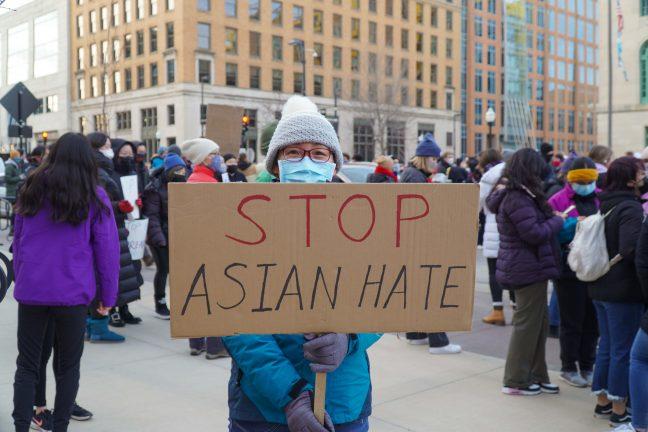Celebrations and virtual programming ensue this month as the University of Wisconsin recognizes Asian Pacific Islander Desi American Heritage Month a few weeks after protests following hate crimes targeting Asian Americans.
This month, the themed programming entitled “The Spaces In Between” will focus on the lived experiences of APIDAs to highlight the ways in which identity continues to be morphed and reimagined in an ever-changing world, according to the APIDA Heritage Month 2021 homepage.
APIDA is a pan-ethnic classification that intentionally includes South Asians (Desi) as part of the community. A plethora of identities and ethnicities are encompassed under the APIDA term, as the classification includes all people of Asian, Asian American and Pacific Islander ancestry who trace their origins to the countries, states, jurisdictions and the diasporic communities of these geographic regions, according to California State University San Marcos APIDA definition.
APIDA groups were brought together based on governmental classifications. The many communities that make up the pillars of this identity use various names to describe themselves. Groupings are ultimately political and part of a dynamic, continuing process of self-determination and self-identification, according to California State University San Marcos APIDA definition.
Can Technology Save us From Racism?: UW’s last RED talk of the year on race, digital revolution
APIDA Student Center Program coordinator Tev Lee said APIDA Heritage Month has been celebrated since 2006. For several years the heritage celebrations were referred to as Asian American Heritage Month. But, with language and terminology changes accompanied by an increasingly inclusive community shift, leaders of the event chose the acronym APIDA to represent the identities celebrated throughout the month.
Lee serves as an advisor the APIDA Heritage Month Planning Committee, which is a student-led initiative within the APIDA Student Center. There are several different APIDA-identifying student organizations, sororities, fraternities and individual students that come together to organize the heritage month, Lee said.
All of these celebrations were transitioned to a virtual setting to accommodate COVID-19 restrictions. The month-long celebration commenced with an APIDA Heritage Festival, Lao and Cambodian Student Association Boba Pick-Up and recent Gala Awards accompanied by a magazine launch, according to the APIDA Heritage Month homepage.
“The transition to virtual programming is nothing new to us this year, seeing as last year right around mid-March is when all of the campus had to transfer virtually,” Lee said. “It was a very tough decision for the planning committee last year because we had a very robust program to be in person and we really had to shove everything out the window.”
Throughout the remainder of April, “The Spaces In Between” will host a movie kit pick-up, Allyship and Action Panel and will close the celebration with a “Minari” movie showing, according to the APIDA Heritage Month homepage.
Environmental justice approaches paramount in combatting climate change, panel says
Nationally, APIDA heritage month is celebrated during the month of May, however, because of the timing of the UW school year, there is not a lot of time to celebrate throughout the month of May, Lee said.
“However, a month is not enough to celebrate our identities,” Lee said. “To inform, educate, celebrate to the general public that this is who we are as a community and to embrace APIDA heritage month is to acknowledge that APIDA heritage is U.S. history.”
The APIDA Student Center planned several events to explore the forces that shape APIDA identity and how they are constructed within and outside the community, according to the APIDA Heritage Month homepage.
Lee illuminated the shifting reality the COVID-19 pandemic brought to APIDA students. The focus of APIDA Heritage month this year reflects the overarching process of understanding one’s identity and the intersectionalities they hold, Lee said.
“COVID has had an impact on how we are seen as the perpetual foreigner or that we don’t belong here in the U.S.,” Lee said. “That has been a really hard journey to navigate during the pandemic and so our theme is really focused on how we as the APIDA community identify with ourselves but also with each other.”
APIDA Student Heritage Month Planning Committee member Katie Hardie said the theme chosen for this year’s heritage month works to follow up on the diversity the university claims to celebrate.
Media institutions have been complicit in climate-related misinformation, journalist says
During a year of heightened conversation surrounding racial and ethnic identity, APIDA communities at times struggled to identify with one classification over another, Hardie said.
“I think that as Asians we have always found ourselves in-between being people of color and not being people of color,” Hardie said. “The theme is also a nod to a lot of us being from immigrant families and us being in the middle of being American and being from our home country, really being in-between cultures in general.”
Students do not have to identify within a community to be in a community. There are ways to be an ally and check-in with people, and a very actionable step to show support is to attend these programs, Lee said.
There is one more event this month — a keynote event with Joel Kim Booster, a queer Korean American LA-based actor, comedian and writer.
Hardie said a great way to start engaging with APIDA communities across UW is to follow @UWAPIDASC on Instagram.
“A lot of student organizations are open to peers and people who may not be in the communities to be part of the conversation so that way they can engage and learn about the community to strengthen their allyship,” Lee said.













